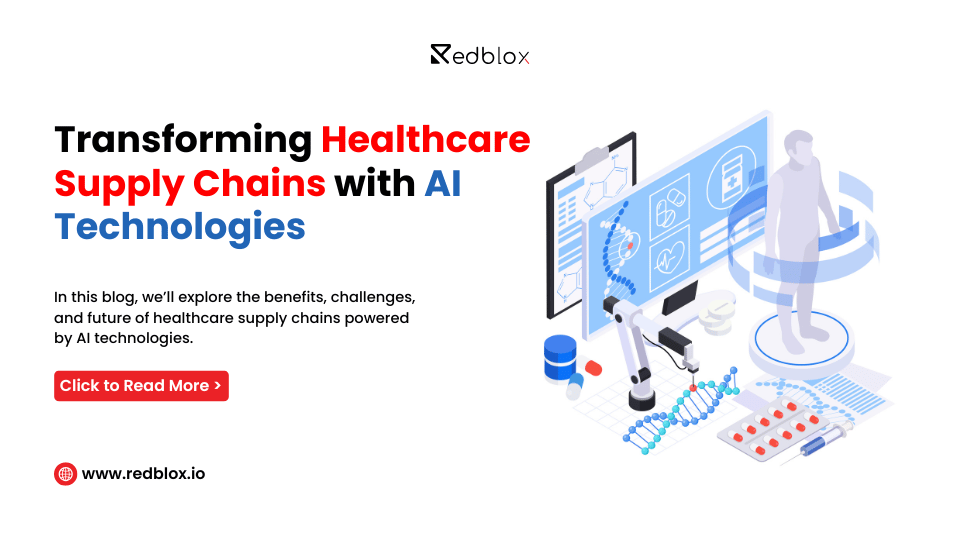Transforming Healthcare Supply Chains with AI Technologies

In the rapidly evolving landscape of healthcare technology, artificial intelligence (AI) is emerging as a game-changing force, particularly in transforming AI in healthcare supply chain management. The traditional healthcare supply chain has long been plagued by inefficiencies, complex logistics, and unpredictable challenges.
Today, AI technologies are revolutionizing this critical infrastructure, offering unprecedented solutions that promise to enhance medical logistics, reduce costs, and ultimately improve patient care.
Current Landscape of Healthcare Supply Chains
Healthcare supply chains are naturally complicated systems with several players, including manufacturers, distributors, hospitals, clinics, and medical providers. These complex networks require precise coordination, real-time monitoring, and adaptive management. Traditional supply chain models struggled with:
- Inventory management complexities
- High operational costs
- Limited visibility and transparency
- Inefficient demand forecasting
- Risk of stock-out or overstocking scenarios
- Slow response to dynamic market conditions
Check: AI Health Monitoring System Development
How AI is Revolutionizing Medical Logistics
1. Predictive Analytics and Demand Forecasting
AI-powered predictive analytics are transforming how healthcare organizations anticipate and manage inventory needs. By analyzing historical data, current trends, and multiple external factors, AI algorithms can:
- Accurately predict medical supply requirements
- Optimize inventory levels
- Minimize wastage
- Reduce emergency procurement costs
- Enable proactive supply chain management
2. Real-Time Tracking and Monitoring
Intelligent AI systems provide end-to-end visibility across the entire supply chain. Advanced tracking technologies enable:
- GPS and IoT-enabled tracking of medical supplies
- Temperature and condition monitoring for sensitive medical products
- Automated alerts for potential disruptions
- Enhanced traceability and compliance
3. Intelligent Inventory Management
Machine learning algorithms can create sophisticated inventory management systems that:
- Automatically reorder supplies based on usage patterns
- Identify potential supply chain bottlenecks
- Optimize storage and distribution strategies
- Reduce manual intervention and human error
Check: How Metaverse is Empowering People With Disabilities
Key Benefits of AI in Healthcare Supply Chains
Operational Benefits
- 30-50% reduction in operational costs
- Enhanced supply chain efficiency
- Improved resource allocation
- Minimized wastage and expired inventory
Financial Benefits
- Significant cost savings through optimized procurement
- Reduced emergency purchasing expenses
- Better financial planning and budgeting
- Increased return on investment (ROI)
Patient Care Benefits
- Consistent availability of critical medical supplies
- Faster response to medical emergencies
- Improved treatment reliability
- Enhanced patient safety
AI Solutions and Technologies
1. Predictive Demand Forecasting Platforms
- Machine learning models analyzing historical consumption data
- Real-time market trend integration
- Dynamic adjustment of supply predictions
2. Intelligent Inventory Management Systems
- IoT-enabled tracking devices
- Automated inventory replenishment
- Condition monitoring for sensitive medical products
3. Blockchain-Enhanced Supply Chain Transparency
- Immutable record-keeping
- Enhanced traceability
- Fraud prevention mechanisms
4. AI-Powered Logistics Optimization
- Route optimization algorithms
- Automated scheduling
- Efficient transportation management
Get Free Estimation - Talk to our AI Experts
Redblox Technologies - AI Development Company
Redblox Technologies stands at the forefront of AI-driven healthcare logistics solutions. Our innovative services combine advanced machine learning, predictive analytics, and IoT technologies to create comprehensive supply chain management systems.
Key Offerings:
- CustomAI™ Supply Chain Solutions
- Predictive Inventory Management
- Real-Time Tracking Platforms
- Compliance and Security Frameworks
Challenges and Considerations
While AI presents transformative potential, healthcare organizations must address:
- Initial implementation costs
- Data privacy and security
- Integration with existing systems
- Staff training and adaptation
- Regulatory compliance
Future Outlook
The future of healthcare supply chains is undeniably AI-driven. Emerging technologies like:
- Advanced machine learning models
- Quantum computing integration
- Edge computing
- 5G-enabled logistics
- Autonomous delivery systems
Will continue to push the boundaries of medical logistics efficiency.
Conclusion
Artificial intelligence is not just transforming healthcare supply chains; it's redefining them. By embracing these intelligent technologies, healthcare organizations can create more resilient, efficient, and responsive logistics ecosystems that ultimately serve patient needs more effectively.
The journey towards an AI-powered healthcare supply chain is ongoing, and those who adapt will lead the way in medical innovation.
Ready to Transform Your Healthcare Logistics? Contact Redblox Technologies today for a comprehensive AI supply chain consultation.
FAQs (Frequently Asked Questions)
Q1: How secure are AI-powered healthcare supply chain solutions?
AI solutions employ robust encryption, blockchain technologies, and advanced cybersecurity protocols to ensure data protection and system integrity.
Q2: What is the typical ROI for implementing AI in healthcare supply chains?
Organizations typically see a 30-50% reduction in operational costs and improved efficiency within 12-18 months of implementation.
Q3: Can AI handle complex medical supply requirements?
Yes, AI systems are designed to manage intricate supply chains, handling everything from general medical supplies to sensitive, temperature-controlled pharmaceutical products.
Q4: How long does it take to implement an AI supply chain solution?
Implementation timelines vary but generally range from 3-6 months, depending on organizational complexity and existing infrastructure.
Q5: Are AI supply chain solutions cost-effective for smaller healthcare providers?
Many AI solutions now offer scalable, cloud-based platforms that can be customized to fit various budget ranges and organizational sizes.